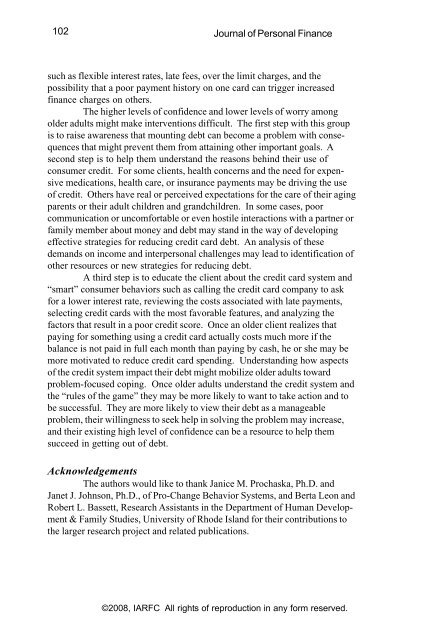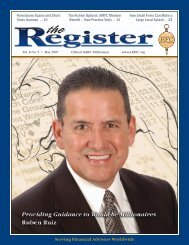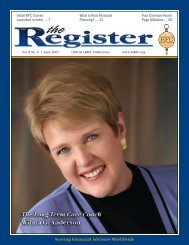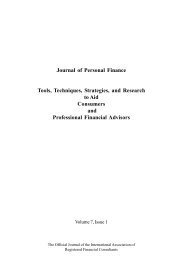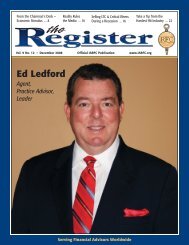3433-vol. 6 issue 2-3.pmd - iarfc
3433-vol. 6 issue 2-3.pmd - iarfc
3433-vol. 6 issue 2-3.pmd - iarfc
Create successful ePaper yourself
Turn your PDF publications into a flip-book with our unique Google optimized e-Paper software.
102<br />
Journal of Personal Finance<br />
such as flexible interest rates, late fees, over the limit charges, and the<br />
possibility that a poor payment history on one card can trigger increased<br />
finance charges on others.<br />
The higher levels of confidence and lower levels of worry among<br />
older adults might make interventions difficult. The first step with this group<br />
is to raise awareness that mounting debt can become a problem with consequences<br />
that might prevent them from attaining other important goals. A<br />
second step is to help them understand the reasons behind their use of<br />
consumer credit. For some clients, health concerns and the need for expensive<br />
medications, health care, or insurance payments may be driving the use<br />
of credit. Others have real or perceived expectations for the care of their aging<br />
parents or their adult children and grandchildren. In some cases, poor<br />
communication or uncomfortable or even hostile interactions with a partner or<br />
family member about money and debt may stand in the way of developing<br />
effective strategies for reducing credit card debt. An analysis of these<br />
demands on income and interpersonal challenges may lead to identification of<br />
other resources or new strategies for reducing debt.<br />
A third step is to educate the client about the credit card system and<br />
“smart” consumer behaviors such as calling the credit card company to ask<br />
for a lower interest rate, reviewing the costs associated with late payments,<br />
selecting credit cards with the most favorable features, and analyzing the<br />
factors that result in a poor credit score. Once an older client realizes that<br />
paying for something using a credit card actually costs much more if the<br />
balance is not paid in full each month than paying by cash, he or she may be<br />
more motivated to reduce credit card spending. Understanding how aspects<br />
of the credit system impact their debt might mobilize older adults toward<br />
problem-focused coping. Once older adults understand the credit system and<br />
the “rules of the game” they may be more likely to want to take action and to<br />
be successful. They are more likely to view their debt as a manageable<br />
problem, their willingness to seek help in solving the problem may increase,<br />
and their existing high level of confidence can be a resource to help them<br />
succeed in getting out of debt.<br />
Acknowledgements<br />
The authors would like to thank Janice M. Prochaska, Ph.D. and<br />
Janet J. Johnson, Ph.D., of Pro-Change Behavior Systems, and Berta Leon and<br />
Robert L. Bassett, Research Assistants in the Department of Human Development<br />
& Family Studies, University of Rhode Island for their contributions to<br />
the larger research project and related publications.<br />
©2008, IARFC All rights of reproduction in any form reserved.


